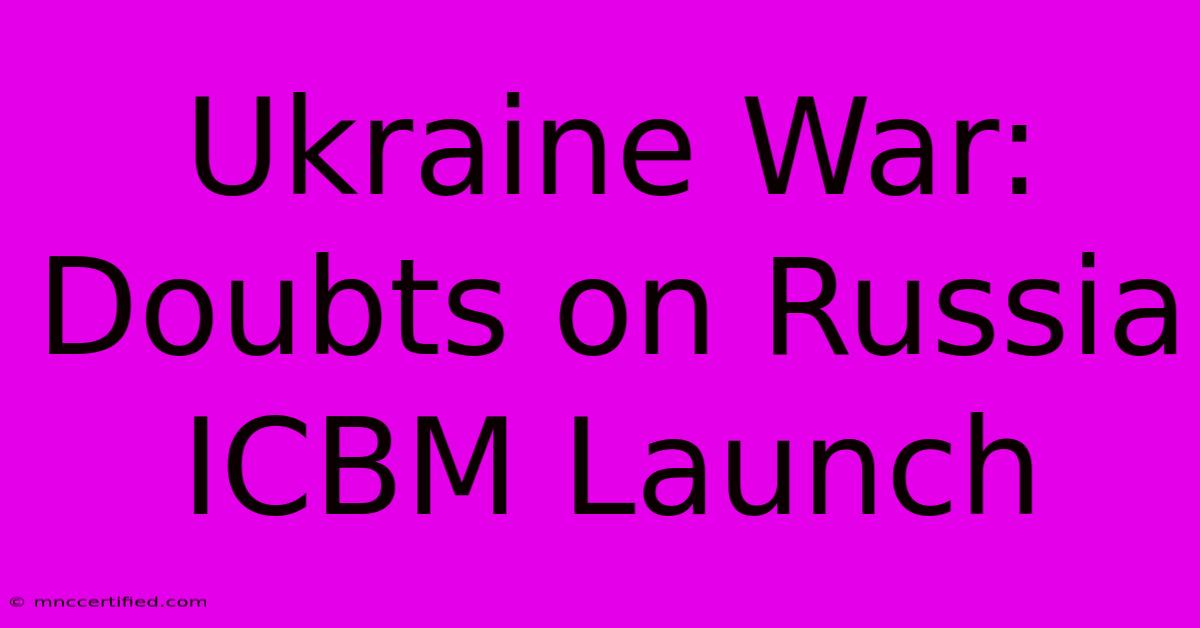Ukraine War: Doubts On Russia ICBM Launch

Table of Contents
Ukraine War: Doubts Emerge Over Reported Russian ICBM Launch
The recent reports of a Russian ICBM launch have sparked widespread debate and uncertainty, raising crucial questions about the veracity of the claims and their potential implications for the ongoing conflict in Ukraine and global security. While initial reports suggested a successful test, skepticism and contradictory information have since emerged, highlighting the complexities of verifying such events and the challenges in navigating the fog of war.
Analyzing the Conflicting Narratives
The initial reports, primarily from Russian state media, portrayed the launch as a successful test of the Sarmat intercontinental ballistic missile, a weapon boasting the capability to carry multiple nuclear warheads over vast distances. This announcement, coming amidst heightened tensions, understandably caused significant global concern. However, several independent analyses and reports cast doubt on the official Russian account.
Discrepancies and Lack of Independent Verification
Key concerns include the lack of independent verification from credible international monitoring organizations. These organizations, usually swift to confirm such significant events, have remained notably silent or issued statements expressing uncertainty. This absence of independent corroboration raises significant questions regarding the transparency and reliability of the Russian claims.
Furthermore, several analyses of available video and photographic evidence have pointed to inconsistencies and potential manipulations. Experts have highlighted discrepancies in trajectory calculations, launch angles, and the overall visual presentation, fueling suspicions of staged footage or deliberately misleading information dissemination.
Geopolitical Context and Information Warfare
It's crucial to consider the ongoing information warfare surrounding the Ukraine conflict. Both Russia and Ukraine actively engage in disseminating narratives that serve their respective interests, making it challenging to distinguish fact from propaganda. The timing of the reported launch – amidst ongoing military operations and international negotiations – further suggests a possible attempt to influence the geopolitical landscape. The launch, whether successful or not, could be interpreted as a demonstration of force, a deterrent, or a tactic to shift international attention.
The Importance of Independent Verification and Transparency
The incident highlights the critical need for robust, independent verification mechanisms to monitor military activities, especially those involving weapons of mass destruction. Strengthening international cooperation and establishing clearer protocols for sharing information are crucial steps in preventing miscalculations and maintaining global stability.
The Implications for International Security
Even if the launch was not entirely successful, the mere claim carries considerable weight. The potential for miscalculation and escalation remains a serious concern. The lack of transparency surrounding the event underscores the fragility of the current international security architecture and the need for improved communication channels to mitigate the risks of accidental conflict or deliberate provocation.
Conclusion: Navigating Uncertainty and Maintaining Vigilance
The doubts surrounding the reported Russian ICBM launch underscore the importance of critical thinking and independent verification in assessing information during times of geopolitical tension. The incident serves as a stark reminder of the challenges in navigating the complexities of information warfare and maintaining global security in an increasingly volatile world. Continued monitoring and analysis are crucial to understanding the full implications of this event and to preventing future escalations. The international community must remain vigilant and prioritize transparent communication to prevent misunderstandings and minimize the risks of a devastating conflict.

Thank you for visiting our website wich cover about Ukraine War: Doubts On Russia ICBM Launch. We hope the information provided has been useful to you. Feel free to contact us if you have any questions or need further assistance. See you next time and dont miss to bookmark.
Featured Posts
-
Is Oxervate Covered By Insurance
Nov 21, 2024
-
Burghart Defeats Labour On Farm Tax At Pmqs
Nov 21, 2024
-
Pet Insurance For French Bulldog
Nov 21, 2024
-
Suits La Gets New Cast Member
Nov 21, 2024
-
Central Florida Insurance Agency
Nov 21, 2024